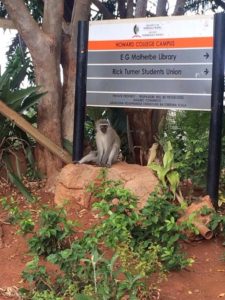
Elena with a snake
As a student attending the Master program “Global Development”, I had the chance of applying for a scholarship for a two-week program at the University of Kwazulu-Natal. I was lucky to get this, and on the 22nd of June this year, I traveled to Durban, South Africa with four fellow students of my master’s program.
After a long journey we were greeted at the airport by staff members of the university, including the professor of the course Political Economy of the Welfare State, of which we attended for two weeks. We were driven to campus where we had our accommodation. We thus got to experience how the local students lived, sharing a kitchen and common rooms.
One particular difference from Norwegian accommodation, was the occasionally visits from monkeys. Even though we saw monkeys who lived on campus every day, we never got used to it and found it funny how we were so close to them, observing them wandering around campus, climbing the building outside our bedrooms and sometimes stealing food from the kitchen.

Monkey on campus! ©Elena Davanger
We attended the two-week course together with local students, participating in group work and lectures at Howard College. The Professor, as well as the other students, were interested in Norwegian politics and welfare systems, and we felt included in all the lecturers.
Through open discussion in class, we learned about South African politics, as well as norms and culture. During group projects, we worked together and presented three different topics; my group discussed problem statements regarding immigration and the world economy. Through our exam (an essay about state capture), I learned even more about politics and corruption, something of which I had little knowledge.
We were lucky, because this year is the 100th anniversary of Nelson Mandela’s birth. We thus were treated to an excursion trip to the Nelson Mandela’s capture site, where we learned about his life and challenges, as well as his legacy. It was amazing to learn about Mandela, not only through lecturers and documentaries, but through the thoughts and knowledge of South Africans. As we spent time in Durban, visiting the city and meeting people, we observed and learned about the effects after the Apartheid regime.

Nelson Mandela’s capture site © Maria Davanger
I myself have been to Africa before. However, I have only experienced the east side of the continent, so it gave me great knowledge experiencing South Africa together with fellow students of different nationalities. Attending classes and participating in “local life” gave me different perspectives and made me feel humble for letting me experience this. For instance, one of the staff members made us feel very welcome by showing us around, not only in Durban city, but also in Umlazi – a township where she introduced us to her friends and family.

Township visit ©Maria Davanger
I am very grateful for this opportunity. I feel this journey has been highly relevant for my masters’ program, and it has also taught me the importance of having knowledge regarding politics of my own country. Travelling together with other students of different nationalities, as well as attending class with locals made me realize how important it is to have knowledge, about politics and history, in order to discuss challenges and possibilities for the future.
